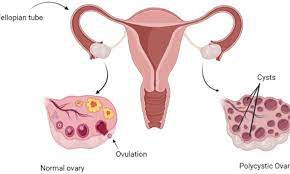Polycystic Ovary Syndrome (PCOS), also known as Polycystic Ovary Disease (PCOD), is a common hormonal disorder affecting women of reproductive age. It is characterized by irregular menstrual cycles, excess androgen levels (male hormones), and multiple cysts in the ovaries. PCOS can lead to a range of symptoms such as infertility, weight gain, acne, and abnormal hair growth, making early diagnosis and treatment crucial.
Diagnosis
Diagnosing PCOS typically involves a combination of:
- Medical History and Symptoms: Your doctor will inquire about your menstrual cycles, symptoms, and medical history.
- Physical Examination: A physical exam may reveal signs like excess hair growth (hirsutism) or acne.
- Blood Tests: These assess hormone levels (androgens, estrogen, and progesterone) and glucose metabolism (to check for insulin resistance).
- Pelvic Ultrasound: This helps visualize the ovaries for the presence of cysts.
Treatment Options
While there is no cure for PCOD/PCOS treatment in jaipur aim to manage symptoms and reduce the risk of long-term complications such as diabetes and heart disease. Treatment strategies vary depending on individual symptoms and goals, such as improving fertility or managing hormonal imbalance.
1. Lifestyle Changes
- Diet and Exercise: A balanced diet low in refined carbohydrates and regular exercise can help manage weight and improve insulin sensitivity, thereby reducing androgen levels.
- Weight Management: Even a modest weight loss can significantly improve symptoms like irregular periods and fertility issues.
2. Medications
- Birth Control Pills: Oral contraceptives can regulate menstrual cycles and reduce androgen levels, improving symptoms like acne and excess hair growth.
- Anti-androgen Medications: Spironolactone and finasteride can help reduce symptoms of hirsutism and acne by blocking the effects of androgens.
- Metformin: This diabetes medication can improve insulin resistance, lower androgen levels, and regulate menstrual cycles in women with PCOS who have insulin resistance.
3. Fertility Treatment
- Ovulation Induction: Medications such as clomiphene citrate or letrozole can induce ovulation in women trying to conceive.
- Assisted Reproductive Technologies (ART): In vitro fertilization (IVF) may be recommended for women who do not respond to other fertility treatments.
4. Managing Specific Symptoms
- Acne Treatments: Topical treatments or oral medications (like antibiotics or hormonal therapy) can manage acne associated with PCOS.
- Hair Removal: Methods such as laser hair removal or electrolysis can effectively reduce unwanted hair growth.
Holistic Approach
In addition to medical treatments, holistic approaches can complement PCOS management:
- Stress Management: Techniques such as yoga, meditation, or counseling can help reduce stress, which can worsen symptoms.
- Supplements: Some women find relief with supplements like inositol, which may improve insulin sensitivity.
Long-Term Outlook
Managing PCOS requires ongoing care and attention to prevent complications. Regular monitoring by healthcare providers is essential to adjust treatments as needed and address any emerging concerns. With early diagnosis and a comprehensive treatment plan tailored to individual needs, many women with PCOS can lead healthy, fulfilling lives.




.png)

Comments